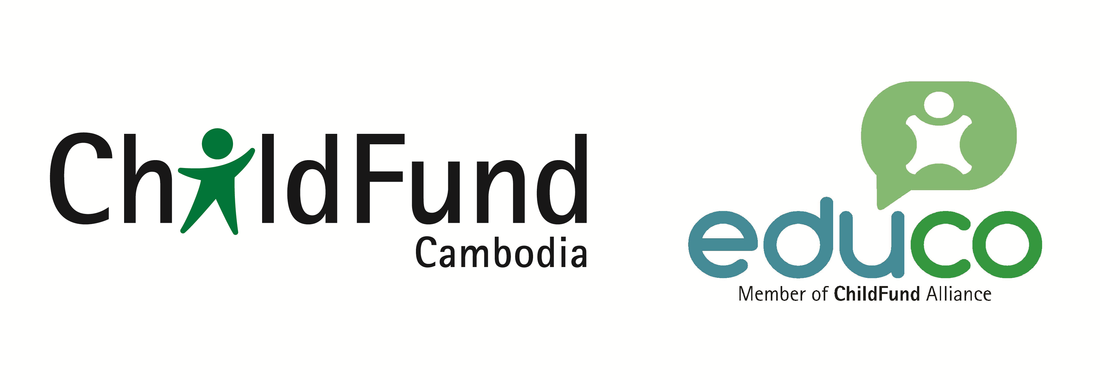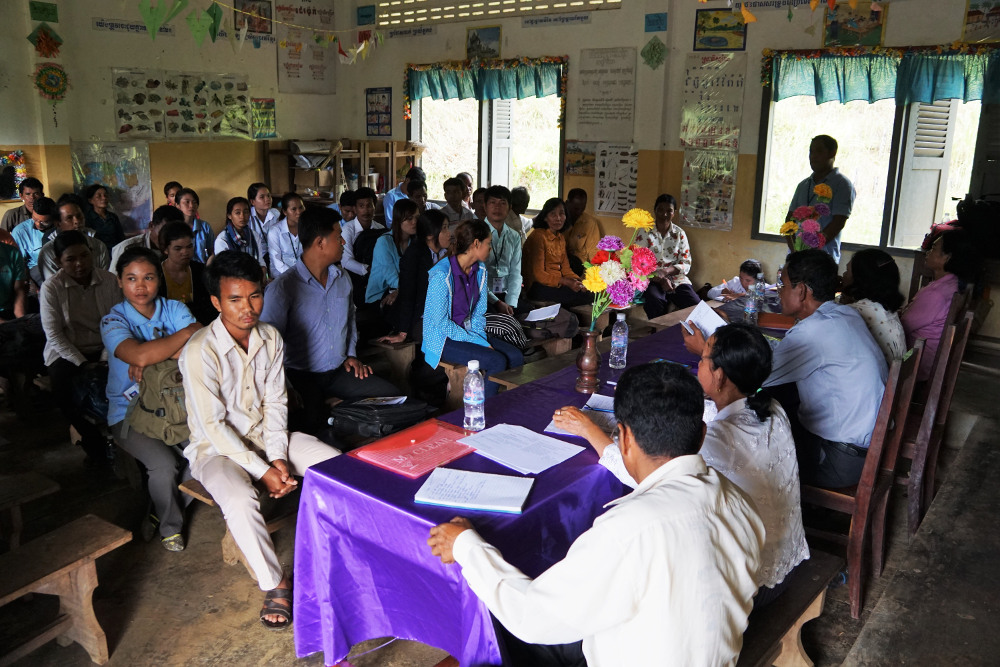Prev Project 2 of 4 Next Project
Copyright Notice: All project content (including, but not limited to, text and images) is owned by KHEN and subject to copyright regulations. In accordance with these copyright regulations, our terms and conditions and Child Protection Policy, please do not copy or reuse images or any other content from this site. View full terms and conditions
SHORT TITLESamlout
PROJECT TITLEImproving Child Rights and Enhancing Education for Children (Location - Samlout District)
PROJECT FOCUS AREASFUNDERSPARTNERSPDoE and DoE
|
For more project pictures please visit our gallery page
|
PROJECT DESCRIPTION
The project aims to improve the accessibility of quality education and other child rights, for all children in the outreach areas of Battambang Province (specifically Samlout), so that these children have the opportunity to fulfil their potential.
The project will work in partnership with key provincial and district counterparts in Education including the Department of Education (DOE) the Principle Offices of Education (POE), Local Authorities, the Commune Councils (CC), the Commune Council for Women and Children (CCWC), and communities and our funders (EDUCO).
Expected outcomes:
a) Increased accessibility of Child Friendly Schools (CFS).
b) A sustainable improvement in the quality of teaching
c) A sustainable improvement in the standard of school management
d) Increased child enrolment, attendance and grade progression in school
e) Increased parent, teacher and child capacity to ensure Child Rights (CR)
f) Improved Child Friendly Schools (CFSs) and communities
g) KHEN is able to effectively apply a Rights Based Approach to community development practice.
The project will work in partnership with key provincial and district counterparts in Education including the Department of Education (DOE) the Principle Offices of Education (POE), Local Authorities, the Commune Councils (CC), the Commune Council for Women and Children (CCWC), and communities and our funders (EDUCO).
Expected outcomes:
a) Increased accessibility of Child Friendly Schools (CFS).
b) A sustainable improvement in the quality of teaching
c) A sustainable improvement in the standard of school management
d) Increased child enrolment, attendance and grade progression in school
e) Increased parent, teacher and child capacity to ensure Child Rights (CR)
f) Improved Child Friendly Schools (CFSs) and communities
g) KHEN is able to effectively apply a Rights Based Approach to community development practice.
WHAT PROBLEM / SITUATION DOES THE PROJECT AIM TO ADDRESS
Access to basic (let alone quality) education is still limited in Samlout, a remote district of Battambang and former Khmer Rouge stronghold. Reasons include: poor road infrastructure, landmines, poverty and education & teachers not being valued by the community.
90% of the population rely on farming as their livelihood and live 25-40 km from the district town centres (based on Samlout census 2013). Sending small children to existing state schools is often not safe or appropriate due to distance. In addition there are not enough pre-schools for the Government Early Childhood Education Program and as such the average starting school age is after 6 years old.
Even where communities value education, they have limited resources for classrooms and child friendly schools. The Ministry of Education, Youth and Sport (MOEYS) has recognised this need in the Education Strategic Plan (2014 – 2018) (ESP), but funding for pre-schools and lower primary schools is not sufficient, and responding specifically to the need for access to education for remote areas has also been insufficient. As a result, the right to education for all children in Samlout is not being met (confirmed in the external evaluation).
The impact of this is clear. The majority of adults have received limited education and have low literacy rates. Traditional practices, some of which are contrary to child well-being, prevail. Many adults are not aware of their responsibilities as duty bearers of Child Rights and do not advocate for education as important for escaping poverty. As such their participation in improving access to education including monitoring of attendance and performance of children and teachers, and investing in schools, is also limited.
To be effective, the project must engage the community and the DOE and D&D, as only by working together will we be able to ensure education for all and the respect for the rights of the child.
90% of the population rely on farming as their livelihood and live 25-40 km from the district town centres (based on Samlout census 2013). Sending small children to existing state schools is often not safe or appropriate due to distance. In addition there are not enough pre-schools for the Government Early Childhood Education Program and as such the average starting school age is after 6 years old.
Even where communities value education, they have limited resources for classrooms and child friendly schools. The Ministry of Education, Youth and Sport (MOEYS) has recognised this need in the Education Strategic Plan (2014 – 2018) (ESP), but funding for pre-schools and lower primary schools is not sufficient, and responding specifically to the need for access to education for remote areas has also been insufficient. As a result, the right to education for all children in Samlout is not being met (confirmed in the external evaluation).
The impact of this is clear. The majority of adults have received limited education and have low literacy rates. Traditional practices, some of which are contrary to child well-being, prevail. Many adults are not aware of their responsibilities as duty bearers of Child Rights and do not advocate for education as important for escaping poverty. As such their participation in improving access to education including monitoring of attendance and performance of children and teachers, and investing in schools, is also limited.
To be effective, the project must engage the community and the DOE and D&D, as only by working together will we be able to ensure education for all and the respect for the rights of the child.
SPECIFIC PROJECT ACTIVITIES
- Project Baseline - KHEN will consult with Educo on a Terms of Reference (TOR) and Project Baseline. (The project baseline aims to collect baseline data and statistics at the start of the project - for later comparison.)
- NGO/Stakeholders Mapping - workshop(s) with P/DOE, local communities, other NGO's, Commune Councils etc to discuss the project and roles and responsibilities.
- Build new schools (better locations and shorter distances for access to schools)
- Child enrolment campaign
- Renovation of 14 state schools to child friendly standards
- Official "New School Year" opening and community teacher recruitment
- Promotion of the value of education through workshops with parents, teachers, local communities etc.
- Follow up and monitoring - KHEN staff will monitor progress on things such as school attendance, drop outs and renovation to child friendly standards (reported on quarterly)
- Training on child friendly standards
- Teacher technical/skills support and training
- School Support Committee (SSC) training
- Development of training skills program and toolkit for building the capacity of Child Club Leaders - the training will involve facilitation, role play, and leadership training in areas such as child rights and child hygiene.
- Child rights awareness raising every 3 months with parents, families and communities
BENEFICARIES
- 1078 children (430 female) aged 6 - 17 years old
- 625 adults aged 18+
- 50 children (20 female) with disabilities aged 6 - 17 years old
- 250 adults with disabilities aged 18+
- 100 preschool aged children (3-5 yrs)
- 18 community teachers (all 18 female)
- 82 state school teachers inc directors (37 female)
- 8 commune council members (5 female)
- 130 school support committee members (35 female)
- 300 model parents (250 female)
INDIRECT BENEFICARIES
- 17 commune council members (3 female)
- 6200 community members (2700 female)
- 1400 state students (600 female)
DURATION
2 Year Pilot + 3 Years Extended, Completing September 2017
AUDIT REPORT
If you are interested in seeing the audit reports (Audited by STF Consult Asia CO. LTD) for this project detailing expenditure please contact us.




